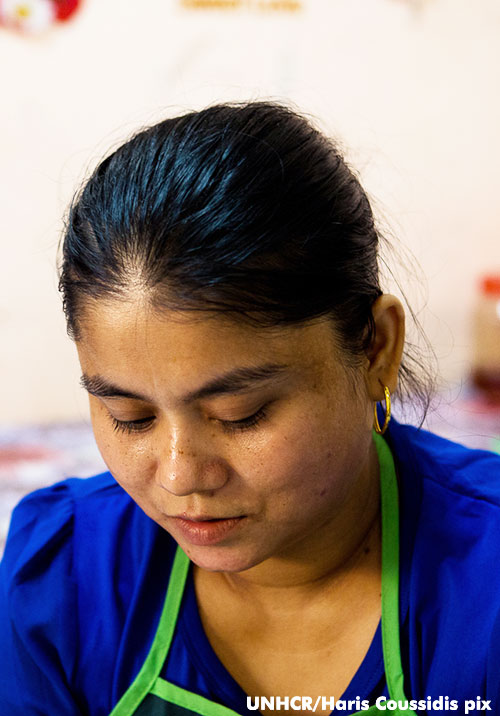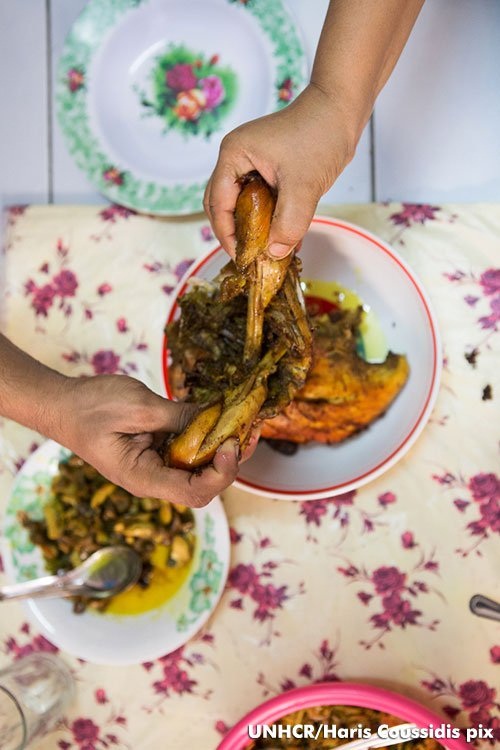Every year, thousands risk their lives on un-seaworthy vessels, hoping to land on safer and more prosperous shores.There are more than 150,000 refugees registered with the UNHCR, the UN refugee agency, in Malaysia.
This, despite the government refusing to sign any international convention recognising the rights of refugees.
In this weekly series for the month of October, we share the stories of the refugees through the one thing that binds us all - food.
Nur Fatima is a petite woman, with a quiet composure who emits a sure sense of confidence and strength.
Coming into the room and wearing his school uniform, her youngest son beams a big smile at her.
She kisses him three times before his older brother Mahmood takes him by the hand to walk him to school.
She makes her way to the kitchen to start the preparation of durus kura, traditional dish unique to the Rakhine state of Myanmar where she comes from.
 Back home, this special chicken recipe is customarily cooked by the bride’s family for their son-in-law, and how the final dish comes out reflects how good a bride she will be.
Back home, this special chicken recipe is customarily cooked by the bride’s family for their son-in-law, and how the final dish comes out reflects how good a bride she will be.
Nur Fatima ( photo ) explains that weddings are a big social event and give the occasion for whole villages to come together and cook.
She misses the closeness and support she had from the community in Myanmar, something that she cannot easily find here.
Having lived in Malaysia for 13 years , Nur Fatima and her husband have tried to reinforce their family’s ties to their homeland.
Children all born in Malaysia
This is especially important to them as their three children were all born in Malaysia and with their friends and school, have known no other life.
They make it a point to cook traditional food and share stories with their children about the history of Myanmar, seeking in this way to preserve their sense of culture and heritage.
They are due to be resettled soon in the United States of America. In the intervening period, they have time to ponder what this new beginning will mean for them.
Her husband looks forward to this change, happy for the chance to make a new start in a place where they will be recognised and have legal status, a place they can grow to call home.
Nur Fatima’s main concern is education for her children and the better opportunities this move will provide for them.
She dreams of a better life for them than what she and her husband had.
Her children are excited to go, even though they are sad to leave their friends behind.
But they are aware that there will be more possibilities for learning there, without the obstacles they have to deal with up to now.
 As the plastic tablecloth is laid on the floor, Nur Fatima puts the finishing touches to her cooking.
As the plastic tablecloth is laid on the floor, Nur Fatima puts the finishing touches to her cooking.
She finishes the frying of the chicken, quickly stirs the beef stew one last time and tosses the banana blossom salad together.
The food is placed on serving platters and the family sits down to eat.
According to tradition, the chicken needs to be divided into two. She and her husband each grab an end and pull.
The chicken is so perfectly cooked that it easily falls apart in their hands, and with that everyone begins to eat.
With their distinctive flavour and texture, each dish surpasses the other in taste. When the children are asked about their favourite food, they all cry “durus kura, of course!” much to their mother’s delight.
During the course of the meal, Mahmood takes his small camera, while his sister Umaira takes her mum’s phone, and they snap pictures of the food, the family and their guests. Pictures that they will take to their new homeland.
Durus Kura (Special fried chicken)
Kampung, or village/free-range, chichen is used for this recipe, as it is smaller and much tastier and will cook faster than a farm-type chicken.
If you are using a regular chicken, you will have to add more water and cook for a longer period, to ensure that it cooks through and remains moist.
Ingredients
5cm long piece of ginger (thumb size), grated
10 garlic cloves, crushed
2 tbsp ground tumeric
1 tbsp garam masala
5 small red onions, grated
½ tbsp of green chilli paste (see below)
1 kampung chicken, whole, cleaned, head and feet removed
350 ml water
200 ml vegetable oil for frying
Method
To make the marinade paste, pound the ginger and garlic until you have a thick rough paste - using this method will bring out the flavours more.
Add the turmeric, garam masala and salt and mix well together. Add the grated onions and green chilli paste and stir until it is all well incorporated.
Cover both the inside and outside of the chicken with the paste. Once fully marinated, truss the chicken by cutting small incisions in each skin flap either side of the cavity and tuck in each leg tightly on the opposite side
Place the chicken in a large pot and add the water. Cover and boil over moderate high heat for 30 minutes, or until the chicken is cooked through.
Depending on the size of the chicken the cooking time will vary, and you might need to add a bit more water.
When ready, you will have a thick gravy-like sauce. Remove the chicken from the pot onto a plate and set to the side. Reserve the sauce in the pot.
Heat the vegetable oil in a large deep frying pan or wok over a high heat.
When the oil is hot, carefully place the chicken and fry on all sides until it has a crispy skin and golden.
Place the reserved sauce on the bottom of a serving plate, place the chicken on top and serve with steamed rice or chapatti.
Green chilli paste
This is a condiment to add spice to a variety of dishes, even when fresh chillies are also used. The paste can be made spicier by adding more chillies.
Make sure that the water covers the chillies during the boiling process.
Ingredients
7 small green chillies
60 ml water
Method
Bring the water to a gentle boil and add the chillies
Boil them over low heat for five minutes. Remove from the heat, set to the side to cool before you put in blender, and process until you have a thick liquid paste.
Over the last year, HARIS COUSSIDIS worked with 17 refugee home cooks, representing 11 countries (Somalia, Ethiopia, Sudan, Palestine, Syria, Iraq, Iran, Afghanistan, Pakistan, Sri Lanka, and Myanmar) to produce and test 55 family recipes, to form the foundation of the cookbook ‘A Taste From Home’.
‘A Taste From Home’ is available at RM60 only at UNHCR, and will soon be made available for sale at selected bookstores. Contact UNHCR at 03-2118 4986 or email: [email protected] for a copy.
All proceeds will go towards the welfare and medical emergency assistance for refugees in Malaysia.
Previously in this series:
Recipe book shows human face of refugees
A Friday feast at Salahuddin’s
Come join Fara’s Iranian culinary class

